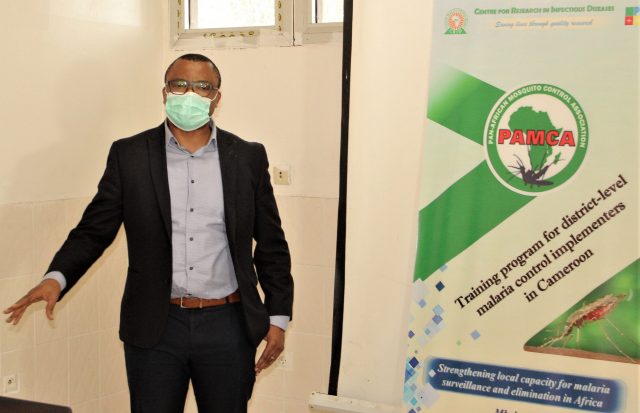Prof Charles Wondji, Executive Dir. CRID
“Of course challenges need to be urgently addressed by research and development. Finding new control tools to further reduce the burden of vector-borne diseases.”
 Tell us what you do and how it’s contributing to the battle against vector-borne diseases, like malaria ?
Tell us what you do and how it’s contributing to the battle against vector-borne diseases, like malaria ?
I study the biology and genetics of mosquitoes – vectors of malaria, dengue and other arboviral diseases. In particular, understanding the genetic basis of insecticide resistance used to control mosquitoes through long lasting insecticidal nets or indoor residual spraying. We detect markers of resistance to design field applicable diagnostic tools used to easily detect & map the spread of resistance. This allows control programmes to make evidence-based decisions on interventions, maximising their effectiveness. Talking about research, development and innovation importance in tackling vector-borne diseases, rather than simply using existing tools, it will emphasise on the fact that, while useful, existing tools are limited in what they allow us to achieve. With goals of attaining pre- or elimination of malaria, we need better tools to overcome the genetic plasticity of mosquitoes that allows them to avoid effects of control tools, this can only be done through quality research and innovation from scientists and industrial partners.
Do you think that COVID-19 will have a positive or negative impact on developing new tools to fight vector-borne diseases ?
It could impact both ways, positively by allowing new tools to be generated and later transferred to the control of vector-borne diseases notably in terms of genomic capacity or even vaccine technologies. It could negatively impact this control because of the restrictions of movements, access to field sites preventing or limiting the testing of novel tools. Of course challenges need to be urgently addressed by research and development. Finding new control tools to further reduce the burden of vector-borne diseases. The risk of not doing, is that we could even lose the efficacy of current tools through resistance & change of mosquitoes’ behaviour – there is a need to be a step ahead of them in this race. If we want to talk about the most promising innovations in malaria control, it would be important to say that, new mode of action insecticides are in the pipeline to help fight resistance in mosquitoes; innovative tools such as gene drive are making good progress and could help further control mosquitoes in the future.
How can we ensure that malaria innovations reach the people who need them most ?
To ensure that malaria innovations reach the people who need them most, they need to be affordable, there need to be well trained people in endemic countries to implement interventions & robust public engagement & communication with local communities. Even with the best tools, if they are not used on the ground then they are useless. According to the question on how is data being used to create innovative malaria control techniques? I would like to say there is a growing movement toward open access to data and knowledge – notably publications. This will speed up the flow of knowledge and facilitate innovation among scientists. Concerning malaria vaccine in the fight against malaria, it would help greatly, although it should not be seen as the only solution neglecting others. If used as part of a toolbox it would help achieve goals of control and elimination.






